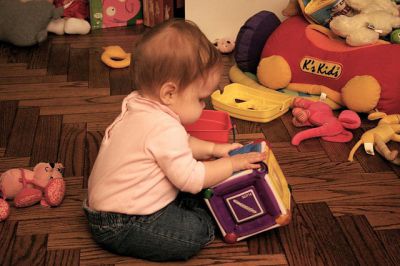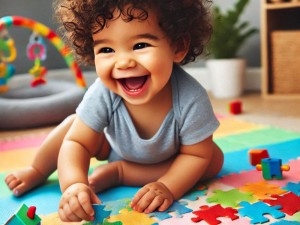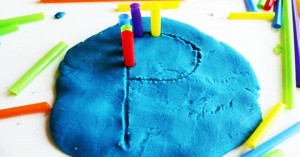Beginning at birth the construction of thought processes, such as memory, problem solving, exploration of objects etc, is an important part of an infant’s cognitive development. An infant needs to interact with their environment in order to learn about it. By using their senses, infants educate themselves about the world around them.
Cognitive Development Milestones
From 0 to 4 months
An infant needs to interact with their environment in order to learn about it. By using their senses, infants educate themselves about the world around them. An infant will develop preferences for certain experiences such as playing peek-a-boo (or) having a bath. They love repetition and also enjoy new experiences.
Milestones Achieved
- lsmiles and laughs
- looks toward direction of sound
- eyes track slow moving target for brief period
- looks at edges, patterns with light/dark contrast and faces
- imitates adult tongue movements when being held/talked to
- learns through sensory experiences
repeats actions but unaware of ability to cause actions
From 4 to 8 months
During this stage infants begin to organize their world through repeated interactions in their environment. Even though an infant doesn't have words to describe concepts such as soft, small, hard or big, they are already beginning to understand these concepts by using their senses. An infant's memory is also central to cognitive development. They can only remember objects for only a few minutes. However, by the end of this stage their ability to remember objects extends to a week or two.
Milestones Achieved
- swipes at dangling objects
- shakes and stares at toy placed in hand
- becomes bored if left alone for long periods of time
- repeats accidently caused actions that are interesting
- enjoys games such as peek-a-boo or pat-a-cake
- will search for partly hidden object
- able to coordinate looking, hearing and touching
- enjoys toys, banging objects, scrunching paper
- explores objects by looking at and mouthing them
- develops preferences for foods
- explores objects with mouth
From 8 to 12 months
From here on, infants will enjoy a stimulating environment which will enable them to develop skills and concepts faster. Activities and toys will become a focal point as infants begin to engage and interact with purpose.
Milestones Achieved
- moves obstacle to get at desired toy
- bangs two objects held in hands together
- responds to own name
- makes gestures to communicate and to symbolise objects, e.g. points to something they want
- seems to understand some things parent or familiar adults say to them
- drops toys to be retrieved, handed back, then dropped again/looks in direction of dropped toy
- smiles at image in mirror
- likes playing with water
- shows interest in picture books
- understands gestures/responds to 'bye bye'
- listens with pleasure to sound-making toys and music
- notices difference and shows surprise
Infants receive the same information as everyone else but perceive it differently based on abilities, experiences and developmental level. Perception is an infant’s way of interacting with all the possibilities in their environment.
Note: Updated as of 18th April 2020.







 Toddlers have a greater understanding of the world around them by this stage. Their cognitive development (also known as intellectual development and thinking skills) continues
Toddlers have a greater understanding of the world around them by this stage. Their cognitive development (also known as intellectual development and thinking skills) continues Infants begin to develop trust when parents begin to fulfil their needs. Such as changing an infant's nappy when needed, feeding on request and holding
Infants begin to develop trust when parents begin to fulfil their needs. Such as changing an infant's nappy when needed, feeding on request and holding Beginning at birth the construction of thought processes, such as memory, problem solving, exploration of objects etc, is an important part of an infant’s cognitive
Beginning at birth the construction of thought processes, such as memory, problem solving, exploration of objects etc, is an important part of an infant’s cognitive Toddlers want to do more on their own and do not like it when you begin to establish limits on their behaviour. Tantrums can become
Toddlers want to do more on their own and do not like it when you begin to establish limits on their behaviour. Tantrums can become Your preschooler is now able to focus their attention more accurately and is less influenced by distractions. The intensity of questions increase as your child
Your preschooler is now able to focus their attention more accurately and is less influenced by distractions. The intensity of questions increase as your child John Dewey is often seen as the proponent of learning by doing – rather than learning by passively receiving. He believed that each child was active,
John Dewey is often seen as the proponent of learning by doing – rather than learning by passively receiving. He believed that each child was active, Toddler advance and gains new skills in Gross Motor Development milestones achieved throughout earlier years. Co-ordination and challenges that could not be performed before such
Toddler advance and gains new skills in Gross Motor Development milestones achieved throughout earlier years. Co-ordination and challenges that could not be performed before such Erik Erikson developed a psychosocial theory to understand how we each develop our identities through eight stages of psychosocial development from infancy to adulthood. The
Erik Erikson developed a psychosocial theory to understand how we each develop our identities through eight stages of psychosocial development from infancy to adulthood. The At this point preschoolers begin to interact effectively with others. Play becomes more innovative and organized and “boyfriend” or “girlfriend” begins to emerge. Preschoolers have
At this point preschoolers begin to interact effectively with others. Play becomes more innovative and organized and “boyfriend” or “girlfriend” begins to emerge. Preschoolers have From now, babies begin to identify and respond to their own feelings, understanding other's feelings & needs and interact positively with others. A baby's social and
From now, babies begin to identify and respond to their own feelings, understanding other's feelings & needs and interact positively with others. A baby's social and


